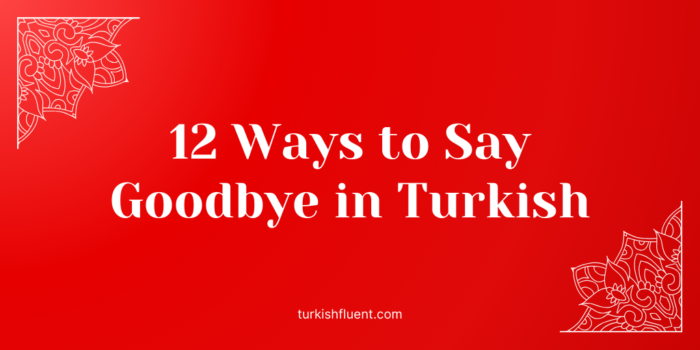Knowing how to say goodbye is just as important as knowing how to greet someone. Turkish offers a variety of expressions for farewells, depending on the level of formality, the relationship between speakers, and even the time of day. This guide will introduce you to 12 common ways to say goodbye in Turkish, helping you leave the perfect impression.
In case you missed it, learn how to say “hello” in Turkish in our dedicated article.
How to Say Goodbye in Turkish?
The Classical “Güle Güle”
The quintessential way to say goodbye in Turkish is “Güle Güle”, which translates to “Go smiling” or “Leave with a smile.” It’s primarily used by the person staying behind to bid farewell to someone who is leaving. It’s a warm and friendly expression that fits most contexts.
Formal Farewells
In formal situations, respectful and polite expressions are essential. Here are some common formal farewells:
- Hoşça Kalın: This means “Stay well” and is used when addressing someone respectfully, particularly elders or in professional settings. For informal situations, you can drop the plural form and say “Hoşça Kal.”
- Hayırlı Günler: A respectful farewell that wishes someone a blessed or prosperous day.
- Kendinize İyi Bakın: Translating to “Take care of yourself (formal),” it’s a thoughtful way to say goodbye while showing respect.
- Görüşmek Üzere: Translating to “See you soon” or “Hope to see you again,” this is a polite and formal way to express the intention of meeting again. It’s versatile and appropriate for various formal or professional contexts.
- Allah’a Emanet Olun: Meaning “May you be entrusted to God,” this is a religious farewell often used in conservative or Islamic contexts. It conveys a wish for the person’s safety and well-being under divine protection.
Informal Farewells
When saying goodbye to friends, family, or peers, these informal expressions are commonly used:
- Bay Bay: A casual, friendly version of “bye-bye” often used among close friends or younger people. Yougn Turkish people also use more and more the Italian “Ciao” to say “goodbye”.
- Görüşürüz: Meaning “See you,” this is a versatile and widely used informal farewell.
- Kendine İyi Bak: Translating to “Take care of yourself,” it’s a thoughtful and friendly way to say goodbye to someone you care about. “Hadi Görüşürüz!” is a slightly more casual version of “Görüşürüz,”, adding a playful or encouraging tone, like “Alright, see you!”
Time-Specific Farewells
Farewells in Turkish can also reflect the time of day. Here are some examples:
- İyi Günler: Translating to “Good day,” this is a polite farewell used during daytime hours.
- Tünaydın: Though rare as a farewell, it means “Good afternoon” and can be used to part ways during early afternoon hours.
- İyi Akşamlar: Meaning “Good evening,” this farewell is appropriate when parting ways in the evening.
- İyi Geceler: Translating to “Good night,” this is used late in the evening or before going to bed.
- Yarın Görüşürüz: Meaning “See you tomorrow,” this is a time-specific farewell perfect for scheduling the next meeting.
Here is a recap video about saying “goodbye” in Turkish:
